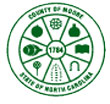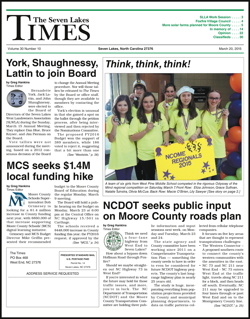 Under NC General Statutes, Moore County property is due for a revaluation for tax purposes on January 1, 2015. The Greater Seven Lakes Community Council asked how foreclosures impact that process.
Under NC General Statutes, Moore County property is due for a revaluation for tax purposes on January 1, 2015. The Greater Seven Lakes Community Council asked how foreclosures impact that process.
Basically, they don't, Appraisal Division Leader Gary Briggs explained during the August 15 joint meeting of the Council and the Commissioners.
Briggs explained that foreclosure sales are typically not good examples of an arm's length transaction, but often involve financial incentives or accommodations that impact the price. Briggs said he had pulled data on seventy Seven Lakes property sales and found only nine that appeared to be foreclosures.
"I tend to think the trend toward foreclosure sales has slowed down, " he added.
Briggs explained that NC law requires that properties be valued for tax purposes at one hundred percent of their market value. In order to arrive at that value, the Appraisal Division has already begun collecting data on "every component involved in the pricing of property," Briggs said.
"There are dramatic differences in land prices from one end of the County to another," Briggs said. So, the appraisal staff divides the County into more than 600 neighborhoods. He noted that there would be several neighborhoods identified within Seven Lakes West, for example.
"Once we get the neighborhoods established," Briggs said, "we look at the improvements: whether it is a single family home, what type of siding, whether it is stick built." Additional considerations include whether a home is on the lake or golf course, or is simply on an interior lot.
What will happen with taxes?
Ultimately, questions about revaluation often boil down to the simple question: "How much more will I pay in taxes?"
Chairman Nick Picerno provided some background on how the Board of Commissioners is likely to answer that question.
In FY 2008, before the last revaluation, Picerno said, Moore County taxpayers were contributing about $38 million to the County's coffers. After the revaluation, the tax rate was dropped by one cent per hundred dollars of value. But County receipts increased to roughly $48 million. Currently, County taxpayers contribute about $54 million.
Over the last five years, Picerno said, as a result of the recession, sales tax revenues flowing to Moore County have decreased from $18 million per year to $13 million per year. In addition, in 2008, voters approved a $69.5 million School Bond, incurring debt that has to be repaid from tax revenues.
"The bottom line is this," Picerno said. 'In the next revaluation, the County right now is pretty much balanced. In other words, the revenue we have is being spent fairly wisely. I think this fairly conservative Board would say that. The only unknown we have is the public schools."
"I can pretty much assure you," he continued "in the next revaluation, given no shock from the public schools, your taxes are going to stay pretty neutral to where they are right now."
The Moore County Board of Education has begun work on a strategic facilities plan, and is expected to ask voters to approve a new bond issue on Election Day 2014.
